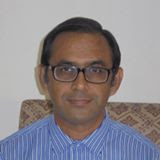This article reminded me of last year. It was Friday, Sep 19, 2014 when I got this opportunity to share one motivating attachment titled "You and Your Research" sent by my esteemed senior colleague Professor Bagchi. [Source: http://www.cs.virginia.edu/~ro
Having said that, this post is meant for the hard-working teachers who also do research - i.e., mostly in India). I once made my observations in response to one Nobel Laureate's articulations in KIIT [see this post dated 30 Nov 2007:There is no such thing as a free lunch ].
I pose one basic question to my community (which we might have visited several times): Why do we do research? Now if the KIIT community and stakeholders develop a shared understanding around this question, then we will be doing a lot in terms of fixing our collective purpose for [also] doing research (i.e., with regard to its potential for impact on the Indian society - which may not necessarily be with regard to its impact on research citations).
Mr. Manu Rajan, in his article, has answered several aspects
of the above question. Here are few excerpts:
Few
excerpts:
[Quote]
Unfortunately, as things stand today, the environment at our premier research institutes is not conducive to knowledge-sharing even among people within the same department! This is because research productivity in these institutes is usually measured by the number of journal papers produced, and the race to maximise the number of publications has given rise to a culture of individualism, secrecy and mistrust. A single-point focus on a number of papers may well result in a marginal increase in the stock of scientific knowledge, but few bold insights can be expected to emerge from such an arrangement.
Unfortunately, as things stand today, the environment at our premier research institutes is not conducive to knowledge-sharing even among people within the same department! This is because research productivity in these institutes is usually measured by the number of journal papers produced, and the race to maximise the number of publications has given rise to a culture of individualism, secrecy and mistrust. A single-point focus on a number of papers may well result in a marginal increase in the stock of scientific knowledge, but few bold insights can be expected to emerge from such an arrangement.
Innovative
knowledge generation in a society like India’s can only occur in an environment
where a multiplicity of knowledge forms are encouraged to commingle and play
with one another. This implies not only greater traffic of ideas between the
sciences and the arts, humanities, social sciences, and policy-making but also
calls for interchange and cross-fertilisation between formal and
institutionally produced knowledge and the manifold forms of informal and tacit
knowledge that lie embedded in the everyday practices of our communities.
Instead of hankering after
global rankings based on dubious measures, perhaps, we should take a leaf from
Youyou’s book and try to foster a more equitable exchange between
specialised scientific expertise and the infinite forms of tacit locally
embedded knowledge that we already possess.
[Unquote]
Read on....There is more in the full article.


No comments:
Post a Comment